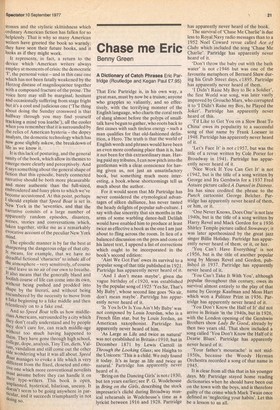Chase
Benny Green
A Dictionary of Catch Phrases Eric Partridge (Routiedge and Kegan Paul E7.95) That Eric Partridge is, in his own way, a great man, must by now be a truism; anyone who grapples so valiantly, and so effec tively, with the terrifying monster of the English language, who charts the coral reefs of slang almost before the polyps of smalltalk have begun to gather, who roots back to first causes with such tireless energy such a man qualifies for that old-fashioned definition, a Hero. The truth is that the world of English words and phrases would have been an even more confusing place than it is, had it not been for this extraordinary man. Having paid my tributes, I can now pitch into the gentleman with a clear conscience for having given us, not just an unsatisfactory book, but something much more interesting, a book .whose shortcomings tell us much about the author.
For it would seem that Mr Partridge has never considered the etymological advantages of silken dalliance, has never tasted the heady delights of popular sub-culture. I say with due sincerity that six months in the arms of some warbling dance-hall Delilah would have enabled him to produce at least twice as effective a book as the one I am just about to fling across the room. In lieu of a balanced discussion on the pros and cons of his latest text, I append a list of corrections which ought to be incorporated in the book's second edition: 'Aint We Got Fun' owes its survival to a popular song of that title published in 1921. Partridge has apparently never heard of it.
'And I don't mean maybe', given the vague birthday of c1920, was established by the popular song of 1925 'Yes Sir, That's My Baby', whose second line goes 'No sir, don't mean maybe'. Partrid,ge has apparently never heard of it.
'Is You Is Or Is You Ain't My Baby' was not composed by Louis Jourdan, who is a French film star, but by Louis Jordan, an American saxophonist. Partridge has apparently never heard of him.
'As Large as Life and twice as natural' was not established in Britain c1910, but in December 1871 by Lewis Carroll in Through the Looking Glass; see Haigha to the Unicorn: 'This is a child. We only found it today. It's as large as life and twice as natural.' Partridge has apparently never heard of it.
'Bring on the Dancing Girls' is note 1930, but ten years earlier; see P. G. Wodehouse in Bring on the Girls, describing the stock impresario's cliché during Broadway musical rehearsals in Wodehouse's time as a lyricist between 1916 and 1928. Partridge has apparently never heard of the book. The survival of 'Chase Me Charlie' is due less to Royal Navy radio messages than to a 1952 Noel Coward revue called Ace of me Eric Clubs which included the song 'Chase Me Charlie'. Partridge has apparently never heard of it.
'Don't throw the baby out with the bath water' is not c1946 but was one of the favourite metaphors of Bernard Shaw during his Grub Street days, c1895. Partridge has apparently never heard of them. '1 Didn't Raise My Boy to Be a Soldier', the first World war song, was later vastly improved by Grouch° Marx, who corrupted it to 'I Didn't Raise my Boy, he Played the Joker'. Partridge has apparently never heard of this.
`I'd Like to Get You on a Slow Boat To China' owes its popularity to a successful song of that name by Frank Loesser in 1948. Partridge has apparently never heard of it.
'Let's Face It' is not c1957, but was the title of a revue written by Cole Porter for Broadway in 1941. Partridge has apparently never heard of it.
'Nice Work If You Can Get It' is not c1942, but is the title of a song written by George and Ira Gershwin for a 1937 Fred Astaire picture called A Damsel in Distress. Ira has since credited the phrase to the Punch cartoonist George Belcher. Partridge has apparently never heard of them, or him, or it.
'One Never Knows, Does One' is not late 1940s, but is the title of a song written by Harry Revel and Mack Gordon for a 1936 Shirley Temple picture called Stowaway; it was later apotheosized by the great jazz singer Billie Holiday. Partridge has apparently never heard of them, or it, or her.
'You Can't Have Everything' is not c1956, but is the title of another popular song by Messrs Revel and Gordon, published in 1937. Partridge has apparently never heard of it.
'You Can't Take It With You', although popular throughout this century, owes its survival almost entirely to the play of that name by George Kaufman and Moss Hart which won a Pulitzer Prize in 1936. Partridge has apparently never heard of it.
'You Don't Know the Half of It' did not arrive in Britain 'in the 1940s, but in 1926, with the London opening of the Gershwin Brothers show Lady Be Good, already by then two years old. That show included a song called 'You Don't Know the Half of it Deane Blues'. Partridge has apparently never heard of it.
'Your father's moustache' is not mid1950s, because the Woody Herman Orchestra recorded a song of that name in 1945.
It is clear from all this that in his younger days, Mr Partridge stayed home reading dictionaries when he should have been out on the town with the boys, and is therefore guilty of the crime which Mark Twain once defined as 'neglecting your habits'. Let this be a lesson to us all.






























 Previous page
Previous page